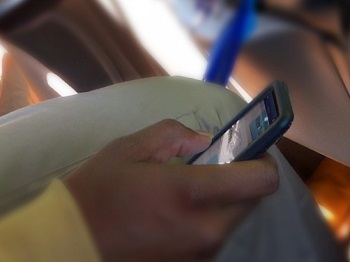Professor Paul Howard-Jones has been speaking out against the banning of these devices in the classroom.
According to Academic, Professor Paul Howard-Jones, banning technology, such as mobile phones, in the classroom is “moving in the wrong direction” and parents should be paying closer attention to the way their children are interacting with other people and with their own tech.
Instead of trying to “demonize” these devices, the professor said it is more important to understand its use.
Howard-Jones cautioned that children are going to continue the use of mobile phones in the classroom regardless of what the rules say. Therefore, he feels it would be much more effective to allow the use and build an understanding of the way these mobile devices are being used by children. He explained that “I share concerns of parents about the effects of leisure technology on sleep and homework and exercise but it’s important that we don’t demonize it completely.”
Instead, Howard-Jones says parents should start looking at the ways their kids are using mobile phones.
 These statements about mobile devices were made by the professor at the same time that he released the results of one of his most recent studies, in which he discovered that playing computer games have the potential to boost the concentration levels among students, giving them an improved ability to better their grades. The research indicated that when learning is presented in game format, the mind of a student is less likely to wander, providing an improved ability to study.
These statements about mobile devices were made by the professor at the same time that he released the results of one of his most recent studies, in which he discovered that playing computer games have the potential to boost the concentration levels among students, giving them an improved ability to better their grades. The research indicated that when learning is presented in game format, the mind of a student is less likely to wander, providing an improved ability to study.
Following this research, Howard-Jones said that over the last number of years, computer games have been “trivialized”, but that if they are properly implemented, they could actually help to enhance a student’s ability to learn. He stated that it is more important to understand the ways in which children are using mobile device and the internet. By banning these gadgets in the classroom, it makes it impossible to gain that information.
“We have to accept that technology is part of children’s lives. It isn’t about restricting it but about how they should be using it in a healthy way,” he said, when discussing the real-life implications of the results of his study.
The Canadian handset manufacturer had said it would step out of the country before revealing its customer data.
BlackBerry has now announced that it will be continuing its operations in Pakistan after the government of that country agreed to withdraw its demands that would require the company to hand over access to all its customer data.
The smartphone maker had developed a plan to leave Pakistan if the government continued the requirement.
Chief operating officer of BlackBerry, Marty Beard, explained in a blog post that the Pakistani government had now taken back its previous order to shut down the company’s services after the company and the government were able to complete “productive discussions”. The shutdown order was originally issued by the Pakistani government back in July 2015 when it said that “security reasons” were behind its decision. A few months later, on November 30, BlackBerry announced its decision to leave the country because it was unwilling to provide access to private customer information to the government.
The Pakistani government had demanded a vast range of backdoor access to BlackBerry customer information.
 Among the information that the company would have been required to hand over included access to BBM chats and BlackBerry Enterprise Service (BES) emails. The smartphone manufacturer said this was “a compromise we are not willing to make.” The initial order from the government was that the company would have to shut down on November 30. However, that deadline was extended to December 30.
Among the information that the company would have been required to hand over included access to BBM chats and BlackBerry Enterprise Service (BES) emails. The smartphone manufacturer said this was “a compromise we are not willing to make.” The initial order from the government was that the company would have to shut down on November 30. However, that deadline was extended to December 30.
According to the company, there are up to 5,000 BES customers currently in Pakistan. It reported through Beard’s blog post that the authorities in Pakistan yielded to the resistance the company had placed against the demands for access to customer information and records. He wrote that “We are grateful to the Pakistan Telecommunication Authority and the Pakistani government for accepting BlackBerry’s position that we cannot provide the content of our customers’ BES traffic, nor will we provide access to our BES servers.”
BlackBerry has not always been as driven or successful in the face of requirements from other national governments for access to user data. For example, in 2013, it gave access to the Indian government. It was able to view emails, BBM chats and internet service customer browsing habits. Reportedly, the company has also established data sharing agreements with the United Arab Emirates, Saudi Arabia and Russia.
 These statements about mobile devices were made by the professor at the same time that he released the results of one of his most recent studies, in which he discovered that playing computer games have the potential to boost the concentration levels among students, giving them an improved ability to better their grades. The research indicated that when learning is presented in game format, the mind of a student is less likely to wander, providing an improved ability to study.
These statements about mobile devices were made by the professor at the same time that he released the results of one of his most recent studies, in which he discovered that playing computer games have the potential to boost the concentration levels among students, giving them an improved ability to better their grades. The research indicated that when learning is presented in game format, the mind of a student is less likely to wander, providing an improved ability to study.
 Among the information that the company would have been required to hand over included access to BBM chats and BlackBerry Enterprise Service (BES) emails. The
Among the information that the company would have been required to hand over included access to BBM chats and BlackBerry Enterprise Service (BES) emails. The 